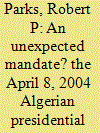| Srl | Item |
| 1 |
ID:
060161


|
|
|
|
|
| Publication |
Winter 2005.
|
| Summary/Abstract |
As part of the Middle East Institute's commitment to promoting and advancing Middle East studies for the next generation, MEI in late 2003 announced the Mrs. Harley Stevens Award for the best essay on a selected theme by a graduate student at an American university. The award was named for Mrs. Harley C. Stevens, a longtime benefactor of MEI and the Middle East Journal, who died last year. The theme chosen for the first competition was democratization in the Middle East, with the essayists encouraged to write on a single case study. Under the terms of the competition, the editor of the Journal chose three judges: Amy Hawthorne of the Carnegie Endowment, Nathan Brown of George Washington University, and Stephen Buck, former US Foreign Service Officer, also formerly with National Defense University. The judges selected this article by Robert Parks (University of Texas), who received his award at the MEI Annual Conference last fall.
|
|
|
|
|
|
|
|
|
|
|
|
|
|
|
|
| 2 |
ID:
060156


|
|
|
|
|
| Publication |
Winter 2005.
|
| Summary/Abstract |
The prevalent perception is that democracy is untenable in Iraq because, it is argued, the country has an authoritarian political culture and no history of democratic institutions. This article presents a counter-narrative that shows that Iraq and its people do not necessarily suffer from an immutable democratic deficit. Focusing on the 1921-1958 era, periods of democratic attitudes and practices are chronicled and traditions of political pluralism and experience with representative political institutions are demonstrated.
|
|
|
|
|
|
|
|
|
|
|
|
|
|
|
|
| 3 |
ID:
060157


|
|
|
|
|
| Publication |
Winter 2005.
|
| Summary/Abstract |
This article focuses on the critical question of ethnicity and politics in Afghanistan. It examines current conceptual models of ethnicity and their application to present-day political affairs in the country. Research shows that it is not the presence of
ethnic groups per se that leads to violence or instability but the absence of civil society and democratic governance and norms. Lessons may be drawn from Afghanistan’s neighbors to the north. These Central Asian nations present cases of emerging civil societies, which are fragile, fragmented, and strongly influenced by the international donor community. After 23 years of war in Afghanistan, repression and neglect have had a devastating effect on civil society.
|
|
|
|
|
|
|
|
|
|
|
|
|
|
|
|
| 4 |
ID:
060160


|
|
|
|
|
| Publication |
Winter 2005.
|
| Summary/Abstract |
This article is a study of the several hundred North Yemenis who went out from isolated Yemen for education between 1947 and 1959. It focuses on their backgrounds, what and where they studied, the impact on them of this experience, what they did when they returned and, finally, the impact they have had on the Yemen most hoped to change. The major conclusion is that their impact has been modest and that this is best explained by Yemen’s socio-cultural system and the political structure it supports.
|
|
|
|
|
|
|
|
|
|
|
|
|
|
|
|
| 5 |
ID:
060159


|
|
|
|
|
| Publication |
Winter 2005.
|
| Summary/Abstract |
This article argues that the reasons behind Egyptian President Husni Mubarak’s policy changes towards moderate Islamists was based on their ability to provide social services via an organized network of contacts. The outcome of this was that Islamists gained informal legitimacy from society but not from the state. This legitimacy was politicized to impel the state officially to recognize the Islamists, but instead of conceding to Islamist pressures, the state launched an offensive campaign to uproot their influence.
|
|
|
|
|
|
|
|
|
|
|
|
|
|
|
|
| 6 |
ID:
060158


|
|
|
|
|
| Publication |
Winter 2005.
|
| Summary/Abstract |
Syria's pursuit of weapons of mass destruction (WMD), or more specifically chemical weapons, developed as a direct response to its military rivalry with Israel, which possesses nuclear arms. Syria's weapons programs were not developed in order to achieve status or to intimidate its neighbors, but rather within the context of the arms race with Israel. The article argues that a more effective means of removing WMD from Syria's arsenal than US sanctions would be to find a way to make progress in resolving the Arab-Israeli conflict.
|
|
|
|
|
|
|
|
|
|
|
|
|
|
|
|